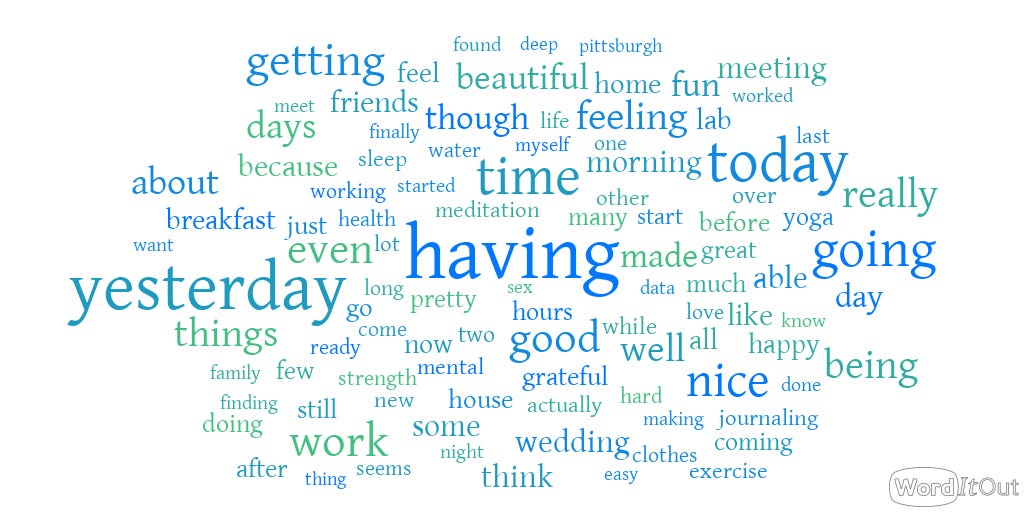You sniff, sucking mucus up into your nose. You blow your nose, trying to get the mucus out. You can’t decide which is better. Your head aches. You lie down—you can’t breathe—you can’t fall asleep. You think, I wish I didn’t have a cold.
Your wish is granted three days later. In fact on most days, you don’t have a cold. What if, instead of feeling bad when you have a cold, you could train yourself to feel good on the days when you don’t?
Let me tell you the story of the last seven years of my life (fast-forwarded). At age 21, I started a PhD. In about two years, I became Depressed. I was also Anxious, so I put off work and binge-watched TV shows to distract myself. I didn’t tell anyone for a long time (the thought of telling made me anxious). It was easier to watch The Office.
Now, at age 28, I am much happier and healthier. I work well. I enjoy leisure, instead of using it as a distraction. I follow through on plans (this is blog post #2! A few years ago, it wouldn’t have happened). I’m comfortable with my achievements. I’m confident even when I don’t succeed, because I know I tried.
A lot of things helped me to get from the dark place of my early PhD years to the functional and happy person I am now. A wonderful therapist, medication, self-help books, and support from friends and family. If I was a plant, these were the sunlight and water that helped me grow.
But there was something else: a practice that has become a solid habit and has transformed my outlook on life. In the plant analogy, I like to think of it as the trellis that supports the vine.
The trellis that supports the vine (created using Dall-E2).
I learnt about gratitude journaling in this video by Kurzgesagt (arguably the best video-makers on the internet). My therapist said it might be useful, so every now and then, I wrote down a few things I was grateful for. It made me feel good.
Then in November 2021, I made a list of habits I wanted to develop. These included meditation, exercise, sleeping eight hours a day and so on. I ranked the habits by how important I thought they were. I put gratitude journaling at the top: I was convinced it would be more useful than anything else. I decided to keep a daily gratitude journal.
In the 570 days that have passed since then, I’ve written an entry on 426 days, or 75% (keeping track of it to helped me build the habit). I prioritised it over everything else. On busy days, it was the last thing I did. On lazy days, I did it when I didn’t want to work. Over time, some magical things happened.
First, it became easier. When I started, I struggled to find three things to be grateful for each day. An entry could be eight words: I am grateful I have food and water. Now I write one or two pages every day. When I’m stuck, I write something “silly” like I’m grateful I have a pen to write with. One thought seeds another; then half the page is full. Gratitude journaling is no longer a chore.
The second magical thing is that my brain turned into a silver linings machine.
I’ve been complaining about the cold (why is it 15oC in June??). On the bright side, we might not need to buy an AC before we move out of this house.
The company I applied to rejected me. I’m grateful that I’m not feeling anxious about it.
Yesterday, we went to a wine tasting event. They ran out of wine (terrible planning). I only got 3 of the 10 wines I paid for. I’m grateful for this because
I don’t have a hangover today.
We left earlier than planned, so my feet hurt less (the heels were killing me).
We got to come home and watch Indian Matchmaking (Season 3, baby!!).
The practice of finding silver linings has spilled over into life. Often, when something upsets me, I find myself thinking of a positive aspect of the situation and feel better.
The third, and most, magical thing is that I’m happier. It is a long-lasting, deep change. Even if I don’t journal on a given day or week, the habit of finding things to be grateful for operates in the background and produces joy and satisfaction.
If you ask me, gratitude journaling is the best thing you can do for yourself1. Being grateful for your friends and family will motivate you to spend more time with them. Being grateful for your healthy body will make you want to exercise and eat well. Being grateful for what you have will help you make the most of it2.
This is a word cloud generated from my first 100 entries. Unsurprisingly, the most common word was ‘having’. But ‘yesterday’ and ‘today’ were next, because I wrote things like The weather was nice yesterday or Today I’m grateful for this ice cream.
Gratitude journaling turns today, yesterday and the average Wednesday into a source of joy3. You don’t have to wait until you get promoted or find love or become famous or lose weight or whatever you want, to be happy. You can be happy about your life as it is now. You can be happy that your microwave is working.
But practising gratitude does not mean ignoring reality. Life can suck. The point is to remind yourself of the good stuff. We get used to improvements; what once brought joy becomes normal4. When we achieve a goal, we forget how tough it was. We tend to remember mistakes and criticism5.
Someone liked your t-shirt? You’ll forget in two days. A bus driver yelled at you because you didn’t have exact change? That will haunt you for a week. If you write down I’m grateful that X noticed my t-shirt and said it was cool, the writing will help you remember. It will build your self-esteem.
The act of writing is important. Typing on your phone is easier, and I do it when I don’t have time to write. But putting words on paper has a stronger effect. It’s slower, so you spend more time thinking about what you’re grateful for. It’s satisfying to flip the pages of a notebook and read previous entries. It’s proof that your life is good.
Gratitude journaling is only useful if you do it often. Once a week is better than never—but I recommend every day6. The problem with once a week is that putting it off until tomorrow is always OK. Postponing for three days isn’t a problem. And when you’ve missed three days, it is harder to do it on the fourth day. ‘Restarting’ the habit requires a lot of willpower7.
These days, it doesn’t take me much effort. I look forward to it, and get antsy when I don’t get time for it. Try to do it every day, and track your efforts. Once you become regular, it won’t matter if you miss a day or three. Getting back will not be hard. But at the start, aim for a daily habit8.
There are those of you for whom none of this matters unless there is hard scientific evidence to back it up (I roll my eyes, while admiring your dedication to empiricism). I found that studies of the effect of gratitude journaling on people’s well-being are not very compelling9. Most of these studies ask participants to practice gratitude journaling for a few weeks or at most, a few months. I am convinced that the effects of this practice need longer to take effect. I noticed changes in my thoughts after a few weeks of regular journaling, but perhaps statistically significant changes in well-being across a group of participants only show up after a year or more.
Imagine a miserable day when you get out of bed at noon and struggle through some zoom meetings. You eat the whole cake that’s in the fridge, then go back to bed for a 20 minute nap. Three hours later you wake up and realise you have missed four deadlines and you’re so annoyed, you order pizza and scroll through social media until 3am. You don’t feel grateful at all. But you think about it, and end up writing:
I’m grateful I have a bed to sleep in.
I’m grateful for cake and pizza.
I’m grateful I have a job where one shitty day won’t get me fired.
It will change your life.
Gratitude journaling is not a substitute for therapy, psychiatric medication or professional help in general. I’m also not advocating gratitude journaling as a method for dealing with trauma or grief. But for most of us going through life’s regular ups and downs, it is a powerful tool to combat dissatisfaction and make us happier.
For a deep dive into gratitude (its evolutionary origin, as a personality trait, and its mental health benefits), here’s a great review article.
This article from the blog Wait But Why has some thoughts (and many diagrams) on why we should focus on being happy with the average Wednesday.
My therapist told me about ‘cognitive distortions’, that we all have to different extents. One of these is magnification of negative events (also called ‘discounting positives’ or ‘mental filtering’). See this website for an overview, this article for data on cognitive distortions in a sample of college students, and this dissertation for a deep dive (including data on cognitive distortions in the general population).
This study found that participants who performed a ‘count your blessings’ exercise once a week for six weeks had increased well-being, but participants who performed the exercise thrice a week had decreased well-being! So take my recommendation for daily journaling with a pinch of salt. I find that it is much easier to stick to any habit if I do it daily than weekly, and that I’m happier when I’m gratitude journaling more often.
Atomic Habits by James Clear is a cool book about how to develop and maintain good habits.
This is one of the most-cited studies on gratitude, in which people who wrote down 5 things they were grateful for, once a week for 10 weeks, reported feeling more optimistic and having better physical health than controls. This study partially replicates their findings. A four week version of the same intervention (but with a smaller sample) found no effect on positive mood.






Thank you for this beautifully written account. I like thinking of the misery we often face, from the view of our expectations. Expectations often drive us to do more and effect change in the way we want. But if we are at a point where there is nothing you can effectively do to improve the world (typical during PhD research) or if our model of the world (everyone else is happy, successful, and doing great things) is incorrect, it goes into overdrive and makes us anxious and paralyzed. Gratitude journals, I feel help us anchored to the real-world and reset the models in our head to what reality actually is. While I haven't done journalling, what I found helpful was just taking the effort to pause and observe anything and everything without judgement and not impose our priors onto it. Slowly the models in our heads change and our perceptions change. I am sure writing helps us immensely to pay better attention.
Thank you for writing down the importance of gratitude Journaling. If you really want to experience the immense power of being grateful and practicing gratitude, Read and the practice "The Magic" Book by Rhonda Byrne. You will be amazed how gratitude can transform your life.